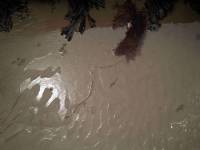Evidence is everything!

Explanations can be wrong!
When people investigate paranormal phenomena, often they stop as soon as they come up with evidence that appears to support a natural explanation. This may seem a sensible thing to do but, scientifically, it is wrong!
The explanation that the investigator has found might be right but it could be wrong! There could be other possibilities, that our investigator hasn't yet looked at, which are a better fit to the evidence. The crucial point is that science is not concerned with ANY old explanation but only the CORRECT one. If an explanation is to be scientifically useful, it should be exhaustively tested against the evidence. You should strive not just for AN explanation but the RIGHT one.
Testing evidence
Imagine you are walking along a street when a young man in front of you stops, leans down and casually picks up an object from the ground. Having caught your attention you stare at the object he is holding and recognise it as a wallet. The young man casually pockets the wallet and walks off. What do you do?
Obviously this depends on what you think you just witnessed. Did the youth find the wallet on the street? If so, is he going to hand it in or keep it? Is it his own wallet, which he had just dropped?
Unfortunately, you don't know and any action you take will rely on assumptions rather than evidence. The crucial evidence that you don't have is, what happened before the youth picked up the wallet? You didn't see what happened because you hadn't noticed the youth until that moment.
Evidence is crucial in science but it must be good evidence. To determine if evidence is good, we need to test it.
So if someone reports seeing a ghost, do you just simply conclude that they saw one and that ghosts must exist? No, because there are many possible alternative reasons why someone might 'see a ghost'. You need to test their observation by considering those alternatives and testing the evidence against them. You could, for instance, question the witness in detail to gain extra information and examine the site where they made their observation for clues. You could set up a vigil to see if you could see the ghost for yourself.
If you come up with a theory that explains the observation, you then need to demonstrate that it is the correct one. This means gathering more evidence - evidence that can differentiate between your theory and other possibilities. In paranormal research, as in science, evidence is everything.
Nature is cruel
Science is the study of nature. It is the study of things as they are, not what we imagine they are, not what we'd like them to be and not just part of a good story!
Evidence makes and breaks scientific theories.That's because theories are just our attempts to explain what we observe. Evidence is always the final arbiter of what is correct and what isn't.
Science is, of course, a human activity. Scientists try to be logical, impartial and critical but it isn't easy. It's not the way humans behave most of the time. Luckily, it turns out that being a little illogical, partial and uncritical can be a good thing in science. It gives scientists imagination and insight that can produce theoretical breakthroughs that might never occur to a coldly dispassionate machine.
In the end, though, any new theory, however it appears, must be tested against the evidence. This is the final court of appeal in science. Nature doesn't care about science (indeed it doesn't 'care' at all). Science has a cruel taskmaster indeed in nature.
Luckily, nature, more than compensates for this cold indifference but providing us with extraordinary and beautiful wonders. Who hasn't marveled at the beauty of a mountain, a flower or a nebula. And who could have guessed at the weird counter-intuitive ways that particles behave at the quantum level of existence.
Author :© Maurice Townsend 2007
Other ASSAP Articles
Unmatched Value, Unfinished Evolution: Why ASSAP Is Reviewing Membership for 2026
REVIEW: Even More…Ghost Stories by Candlelight at Shakespeare North Playhouse by Rob Gandy
Dark Secrets The Exhibition delights in darkness!
Previewing the Dark Secrets Exhibition!
ASSAP Announces Formation of Expert Advisory Panel
Exceptional Training Weekend - is available to book! Find out more!